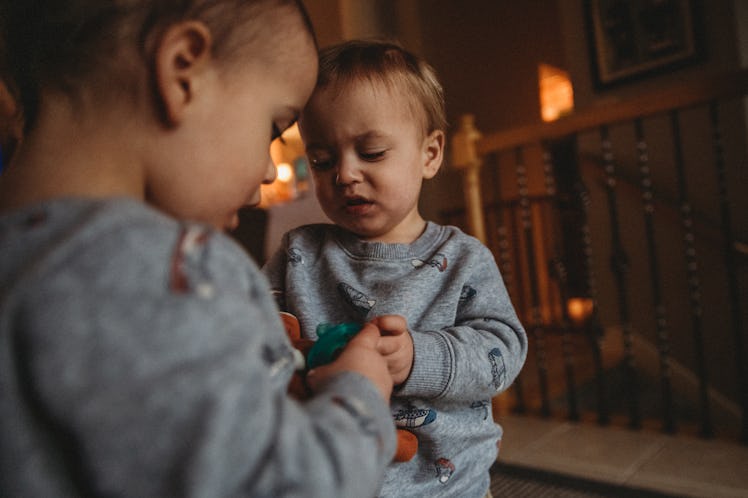My Toddler Is A Bully. Here’s Why I’m Ignoring Her Bad Behavior.
There's a method to my madness, I promise.

The clothesline came out of nowhere. My 18-month-old twins Penelope and Clementine were playing together when Penny threw out an arm and floored Clemmy in the style of Shawn Michaels. Before the assault, Clemmy was happily dragging a large broom across the kitchen, and Penny was situated on the floor putting a puzzle together. Then, boom! Clemmy was on the floor crying and Penny was in possession of the broom.
The finishing move happened right before my eyes. I made no attempt to reprimand Penny or to console her sister. Not only did I not act, but I immediately turned my back from the girls to avoid eye contact.
I understand if this makes you want to strip my dad badge, as though I were a renegade cop in an 80s action movie. Although I must admit the idea of a forced vacation is quite seductive, I assure you there’s a method to my madness.
Penny has been bullying her sister for months, and no matter how her mother or I respond, she persists. Toddlers don’t understand personal property and can’t distinguish between “mine” and “yours.” Were we to pry whatever was Clemmy’s from Penny, it would just reinforce that it’s okay to grab. Penny clearly understands the words “stop” and “no,” but gleefully disregards our verbal reprimands. She has laughed in our face. She seems to thrive in chaos. In fact, the more we intervene or attempt to impose discipline, the more she enjoys it. At a loss, we were prepared to channel her violent impulses in the hopes that she might turn out like Dexter or Batman.
But it turns out that Penny is not a psychopath. She’s really just a toddler. A pretty normal one, at least according to our pediatrician. Many toddlers lack the self-control to inhibit this type of behavior. They see the toy, feel they must have it, and take it without any awareness or thoughts of right or wrong.
Toddlers also crave attention. It’s really all they understand. So, according to our doctor, the best way to “punish” Penny is to do nothing. In fact, any form of attention will most likely reinforce her bad behavior.
“If you must intervene, you still want to avoid undue attention,” he said. “Calmly redirect Penny away from her sister while avoiding eye contact along with a quick verbal reprimand.”
“What about Clementine,” I asked? As long as she isn’t hurt or inconsolable, he told me, it’s best to ignore her, too. “If you always intervene, you run the risk of creating a professional victim.”
So, to sum it up, our pediatrician gave us permission to ignore our babies.
I’ve been calling this particular chunk of my dad life as “spectator parenting” or “non-intervention.” The goal is to provide tots with the opportunity to work things out on their own. They may not get it right away, but over time, they’re learning how to read social cues.
For example, the other day Penny tore a ball from Clemmy’s hands. On cue, Clemmy fell to the floor in frustration. Penny did a celebratory jig and then looked in my direction. I desperately wanted to pry the ball from her hands and return it to Clemmy. Instead, I walked away and pretended to leave the room.
Unbeknownst to Penny, I continued watching her from around the corner, like a wildlife photographer trying not to disturb two warring lions in their natural habitat. Clemmy was still crying on the floor. But, eventually, Penny sat down next to her, babbled something incoherent, and then gently set the ball on the floor next to Clemmy. Success!
I certainly see the promise of non-intervention, but it’s also difficult to consistently adhere to it. Instinctively, I don’t like the idea of letting Penny “get away” with thievery. Maybe it’s the attorney in me, but we all have a natural instinct for justice. Similarly, my wife finds it nearly impossible to ignore Clemmy, the aggrieved victim.
But, in practice, we’ve been surprised. Over time, Clemmy has proven to be more adaptive than we gave her credit. She may be upset for a moment, but if we let it pass, she will often move on to a different task or toy.
It turns out that our doctor may have been right. And in this war of attrition, it’s always good to have another weapon in the arsenal.
This article was originally published on